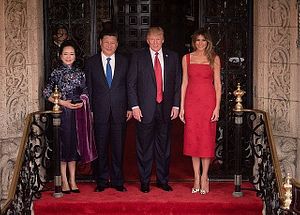Around 18th Party Congress in 2012, there was speculation that the reason why the Politburo Standing Committee was being reduced in size from nine to seven members was because in the Hu Jintao era there had been perpetual stalemate over big issues. Fewer people meant a smaller group to sign off on things, and few chances of time-consuming, and sometimes debilitating, intra-elite dissent. If that was indeed the intention, it seemed to work. From 2013, the new leadership seemed infected with a zeal to attend to everything from intra-Party discipline, to reforming the household registration system, and doing something about the complex relationship between the central and provincial governments. Law received fresh attention, and foreign policy got a complete makeover, clarifying its contours and coming out with clear strategic guidance.
The side effect of this has been the increasing prominence of Xi Jinping at the heart of this process. He seems to have grown to such an extent that his imprint is everywhere. His words are quoted in support of almost every policy area, whether it be economic, cultural, or geopolitical. Xi is recognized as a “strong leader” – the antithesis of the self-effacing, and seemingly perpetually indecisive Hu.
As historian Archie Brown made clear in his study from 2014, The Myth of the Strong Leader, one has to be a little sanguine about the claim of leadership omnipotence. Strong leadership is mostly about image manipulation. And history is littered with figures who seemed all powerful one moment, and then tumbled and left chaos in their wake the next. China has not been immune to this. In the not-so-distant past, figures like Hua Guofeng, Hu Yaobang, and Zhao Ziyang all looked secure – until they started to look insecure, and faded from prominence.
Xi is in a far more central position than they. For a start, he has no one around him who looks like a clear successor at the moment. But that could be interpreted as much as a sign of vulnerability as anything else – his fear of even a successor-in-waiting as a kind of threat. So too could the never ending accrual of formal titles. They seem to be compensating for something, rather than really reinforcing the raw power that he might have. What is most striking though, particularly at the moment with the turbulence with the United States is just how exposed Xi is. His dominance domestically means that while he takes all the praise when things go well, he also stands direct in the firing line when there are issues.
The problems with the United States currently illustrate this. They are not Xi’s direct fault. Partly, they are down to the maverick, chaotic nature of the Trump presidency, which is causing everyone headaches. Partly they are due to the residue of imbalances the distortions in the trade and investment relationship between the two powers, which have built up over the last few decades, long before Xi had any influence. And partly they are just the growing pains of two major powers entering into a different phase of their relations.
Despite all this, making sure he keeps the U.S.-China relationship on track is among the most important parts of Xi’s unwritten job description. No one else apart from Xi can really do this, particularly with the concentration and centralization of powers that have happened under this leadership. While Vice President Wang Qishan does have a core role in this, the buck stops not in his office at Zhongnanhai, but at Xi, the Chinese Communist Party secretary and China’s president.
That might explain the rumors of discontent at the moment with how Xi is handling the escalating trade conflict with the United States. Again, this was something started at the United States’ behest. But there are inevitable complaints that nevertheless Xi should have been better prepared. He clearly didn’t think, even if he was told, that the United States would go ahead with the measures it has imposed. And beyond retaliation so far, he seems to have had no bold ideas for how to handle the situation.
These are dangerous issues, because for all Xi’s dominance, he is clearly exposed. An issue like this, if it does prove economically damaging, could stoke up widespread discontent. Discontent could easily form itself into outright opposition. The mantra will be that Xi has so far been lucky, and that now he faces a real challenge, he has shown himself lacking in the real grit of top-level leadership. Those touched, directly or indirectly, by the merciless anti-corruption movement of the last few years will be able to plot their moment of revenge. Xi has plenty of enemies around him – every Chinese leader has these. The issue is how many of them would move to do something about their resentment if they saw him weakened.
The world should not be too jubilant about a weaker Xi and a more unstable China, though. The cost of the Trump measures is that while they focus, almost obsessively, on the issue of imbalances, and that might be legitimate, they do not put in place any vision for what might happen to a world configured in a different way. China definitely needs to change, that’s true. But that doesn’t mean returning to a neatly marked box put there by others for it to occupy. And a China afflicted with uncertainty along the lines of the rest of the world at the moment would be a catastrophe.
That’s why Xi needs to get a grip on the U.S. issue, rather than the issue starting to get a grip on him.

































